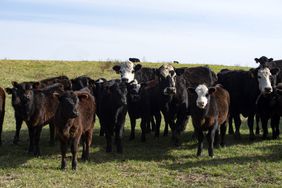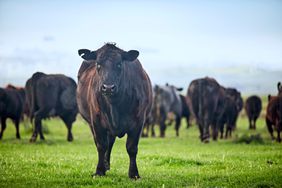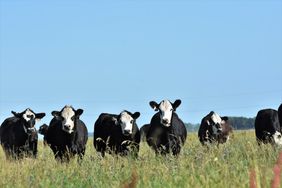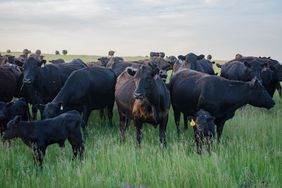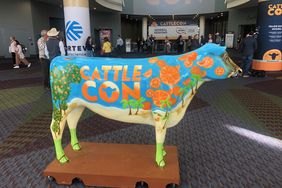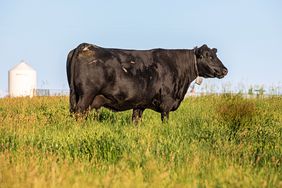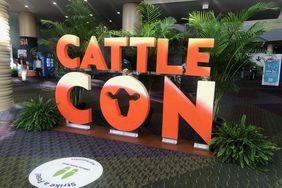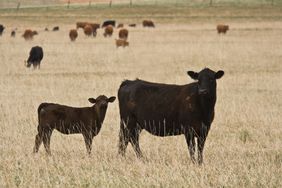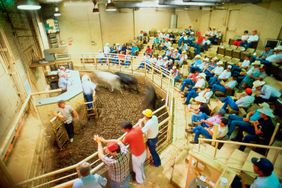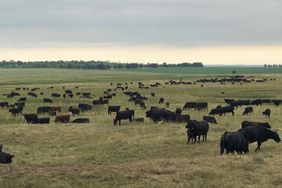:max_bytes(150000):strip_icc()/28694bull-2f5e110dbb6249caa8f8698feaf2f2ba.jpg)
Courtesy of HeartBrand Ranch
Calves out of a bull like the one pictured above might qualify for a premium from the breeder where he was purchased — maybe $120 to $150 per calf over standard market.
This buyback program is offered by HeartBrand Ranch (heartbrandcattle.com) in Flatona, Texas. Its Akaushi breed of cattle, noted for the extreme marbling, tenderness, and eating quality of its meat, was brought here from Japan about 30 years ago. HeartBrand is developing a preferred beef market in upscale restaurants, retail, and export.
Demand for the product is outstripping supply, says JoJo Carrales, HeartBrand’s vice president of cattle operations. The company has about 3,000 mother cows of full- and part-blood breeding, but they need 20,000 to meet the demand for 350 head of finished Akaushi a week. That need has prompted the company to partner with others to produce half-blood calves, then buy the calves for HeartBrand feedlots and the Akaushi supply chain.
If the producer prefers to finish calves, HeartBrand will buy them at harvest weight (about 1,400 pounds) at premiums of $300 a head or more.
Buyback program qualifications
To qualify for the buyback program, the calves have to be DNA-verified to a full- blood Akaushi bull. The producer pays for the DNA test, but that cost is reimbursed upon qualification. Also, no hormone implants are allowed.
“Most calves we buy are around 650 pounds, but they range from 500 to 850,” Carrales says. “We like them weaned for 30 to 45 days before we get them, and we buy both steers and heifers. We can work with all sizes of commercial producers, but the most efficient way is to put together a truckload of about 80 head of 650-pounders.”
Carrales is not concerned with location or cow breed. “We commonly work with Angus-based herds because that’s what most of them are. Our red bulls on Angus cows will give a calf that is polled and black.
It’s a good cross, because the Angus breed has done so much work on carcass quality.”
Hereford-based cows work well, too, and usually give a brockle-face calf.
You’re likely wondering if you’ll give up weaning weight with an Akaushi bull. “It’s the most common question I get,” Carrales says. “This is what I hear from producers we already work with: You won’t give up any weaning weight. With full-blood Akaushi, you might. With an Akaushi bull on another breed, you’ll get 100% heterosis in the calves that maybe you aren’t getting now. Feedlot data tells us we don’t give up performance there, either.”
The actual premium of the HeartBrand buyback program is based on the five-day CattleFax average for fed cattle. Feeder cattle premiums are 20¢ per pound above similar weight and quality cattle. “Our customers tell us that’s what they need to justify their time and effort,” he says.
HeartBrand also pays shipping fees to the feeding or harvest facility. That, plus the fact there is no sales commission and no extra weight loss at a market, could add another $50 per head to your net sales advantage, Carrales says.
“Our buyback program is a way for you as a commercial producer to get more direct control of cattle marketing and be a part of a bigger system of beef marketing. We share carcass and feedlot performance with you, too. Maybe you haven’t seen that before. And you share in better profits,” he summarizes.
HeartBrand beef sells about 500 bulls a year, at an average price of about $7,000.
:max_bytes(150000):strip_icc()/28694JoJoCarrales-d4e06cfa5d7e4d5da5965db5b9bd2869.jpg)
Courtesy of HeartBrand Ranch
Other buyback programs
HeartBrand Ranch is not the only seed-stock producer offering calf buyback programs. Here are four others.
Valley Oaks Cattle Company
Oak Grove, Missouri
Operations manager Jeff Gooden says Valley Oaks offers to buy back calves sired by its Angus bulls. “We have our own feedlot and small harvest plant. We know calves from our bulls will do well for us, so we offer the buyback program,” he says. “We pay a 5¢ per pound premium over the weekly USDA market report for that weight of cattle.”
Besides the premium received for the calves, the producer pays no commission or yardage fees when the calves are delivered and takes no weight shrink. The calves are subject to DNA verification to a Valley Oaks bull. They must also meet a health protocol, have been weaned at least 30 days, and weigh a minimum of 600 pounds.
The program has been offered for more than five years and is now getting more interest as bull customers look for a way to capitalize on good genetics, Gooden adds.
44 Farms
Cameron, Texas
Angus breeder 44 Farms has developed a beef supply chain with Walmart in a program called Prime Pursuits. To get cattle for the program, 44 Farms will purchase calves that fit the specifications of the program: predominantly 44 Farms genetics, no hormones, black or black baldie, weaned 45 days, and no more than 90 days from youngest to oldest in the group.
The price received depends on several factors, says operations manager Doug Slattery, including genetic makeup of the cow herd, history of carcass and feedlot performance, location, and level of 44 Farms genetics in the herd. If calves qualify, they’ll go to one of nine feed yards in the program.
“We have established a reliable supply chain of known genetics that is consistent and is available to us year after year,” Slattery says. “Our bull customers like to forward contract calves to a known buyer and not have to navigate the risk of the open market.”
Linz Heritage Angus
Crown Point, Indiana
This Angus breeder will purchase weaned calves and feeders sired by Linz bulls from either AI or natural conception, says manager Anthony Randall. While not having a stated premium, Linz will purchase calves by private treaty or through video and live auctions at the top of the market.
Randall says the program supports its seed-stock customers and supplies Meats by Linz, a direct-market beef company, with a superior product.
“The purchased calves are fed at privately owned feed yards selected for their commitment to finishing high-quality cattle,” he says. “The buyback program serves as a bridge between Linz Heritage Angus and Meats by Linz. It’s fully integrated from conception to plate.
“We also share the carcass data and feedlot performance with the producers, and work with them on breeding recommendations.”
Topp Herefords
Grace City, North Dakota
This breeder offers a unique heifer buyback program to commercial ranchers who use its bulls on Angus-based (black or red) cows. Ryan Topp says the company will buy replacement-quality F1 baldy heifers and develop them for sale as bred heifers.
“We establish a per-head contract price with the producer in early September for delivery to us around Nov. 1,” he says. “The price we pay for the heifers roughly equates to steer price, meaning you don’t sell those heifers at a discount as feeders.”
In addition, Topp Herefords has offered its bull customers a marketing program to place feeder calves at an advantage either through forward contracts, retained ownership contracts, or local market bids.
